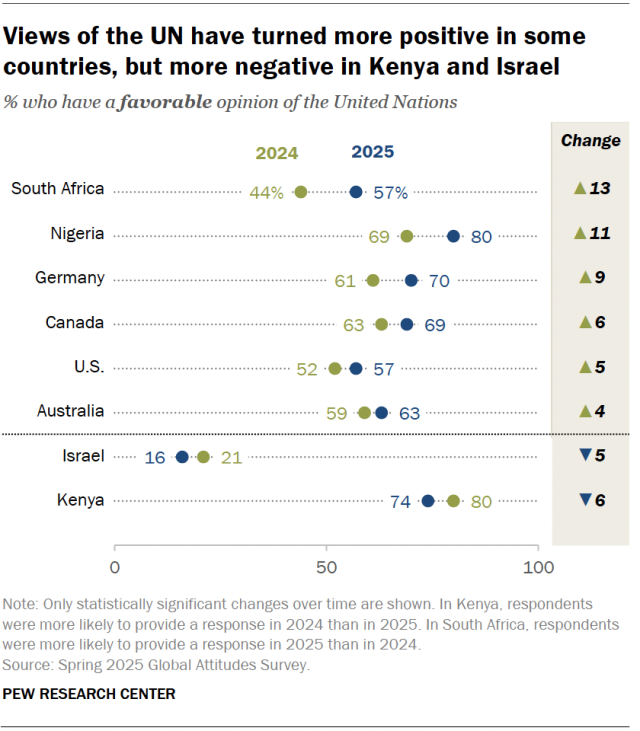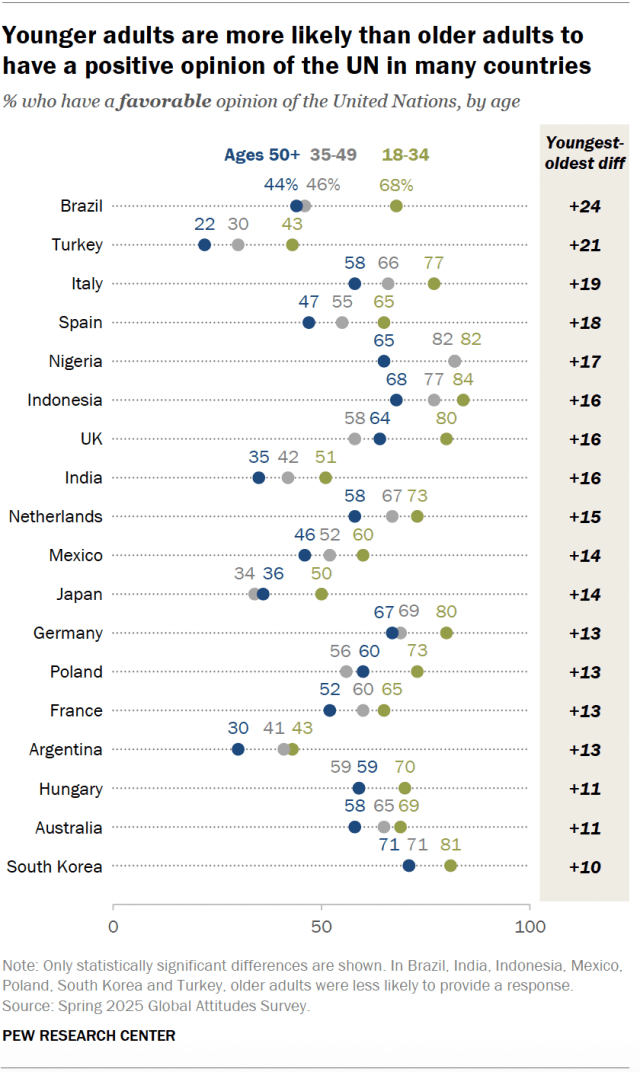
Ahead of the 80th session of the United Nations General Assembly in New York, people around the world continue to see the UN in a largely positive light, according to a survey of 31,938 adults in 25 countries earlier this year.
A median of 61% of adults across the surveyed countries have a favorable view of the UN, and 32% have an unfavorable view.
Views of the UN

Opinions about the UN are particularly positive in Canada, Sweden, Germany, Indonesia, South Korea, Nigeria and Kenya. In each of these countries, about seven-in-ten adults or more have a favorable opinion.
Sentiment is least positive in Israel, where just 16% have a favorable view of the UN, the lowest share across all countries polled.
Related: 8 in 10 Israelis view United Nations unfavorably
How views of the UN have changed over time
Since 2024, people in some countries have become more favorable toward the UN. Nigerians are 11 percentage points more positive about the organization this year than last year, while attitudes have also become more positive in Germany (+9 points), Canada (+6), the United States (+5) and Australia (+4). South Africans also have more favorable views of the UN compared with last year. But a larger share of South Africans offered an opinion in 2025 than in 2024.

In the U.S., views of the UN have turned more positive for the first time since 2022. This year’s survey was conducted before the U.S. announced plans to withdraw from the UN Educational, Scientific and Cultural Organization (UNESCO), but after it withdrew from the UN Human Rights Council (UNHRC).
Jump to U.S. spotlight.
Attitudes about the UN have not improved everywhere. In Kenya and Israel, the shares of adults with a favorable view of the organization have dipped 6 points and 5 points, respectively, since last year. But adults in Kenya were more likely to provide a response in 2024 than in 2025.
Views of the UN by age

In the surveyed countries, adults under 35 are generally more likely than adults ages 50 and older to have a favorable opinion of the UN. This is a consistent pattern observed in previous Pew Research Center surveys.
In Brazil, for example, 68% of the youngest adults have a positive view of the UN, compared with 44% of their oldest peers. (Brazilians ages 50 and older are also less likely to provide a response.)
These age differences appear in middle- and high-income countries alike (as defined by the World Bank), as well as in different world regions.
Views of the UN by ideology
In nine surveyed countries, people who place themselves on the left of the ideological spectrum are more likely than those on the right to have a positive view of the UN. This divide is particularly wide in the U.S., where 81% of liberals – versus 34% of conservatives – have a favorable opinion of the organization.
The other eight countries where this ideological difference exists are Australia, Canada, France, Israel, the Netherlands, Poland, Turkey and the United Kingdom. (Turkish adults on the right are less likely to provide a response to this question.)
This is another consistent pattern established in earlier Pew Research Center surveys.
Country spotlight: U.S.
Americans have a more favorable than unfavorable opinion of the UN (57% vs. 41%). This represents a small but statistically significant increase in positive attitudes since last year, when 52% of Americans saw the organization favorably.
Democrats and Democratic-leaning independents are about twice as likely as Republicans and Republican leaners to have a favorable view of the UN (77% vs. 37%). Since last year, favorable views of the UN have increased by 6 percentage points among Democrats but have not changed among Republicans.
Democrats ages 50 and older are somewhat more likely than Democrats under 50 to see the organization favorably (80% vs. 74%). However, the reverse is true among Republicans: Younger Republicans are more likely than older Republicans to view it positively (42% vs. 32%).
We also asked Americans how much the U.S. benefits from UN membership. Overall, 63% of Americans say it benefits at least a fair amount, while 35% say it does not benefit too much or at all. Since last year, there has been a slight increase in the share of Americans who say the U.S. benefits from UN membership.
Democrats are more likely than Republicans to say the U.S. benefits from UN membership, and the share of Democrats who have this opinion has increased over the past year.
Related: How the United Nations is funded, and who pays the most
Note: Here are the questions used for this analysis, along with responses, and the survey methodology.

